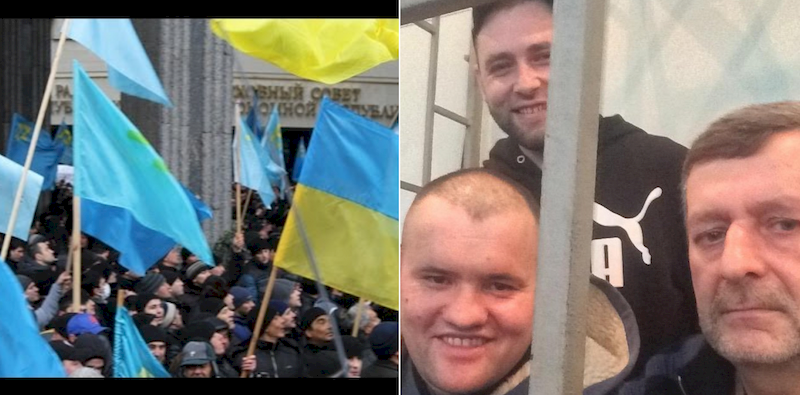Verdicts awaited in Russia’s most openly anti-Crimean Tatar ‘trial’
 The ‘trial’ has ended in Russian-occupied Crimea of five Crimean Tatars accused of ‘involvement’ in a pre-annexation demonstration over which Russia has no jurisdiction. ‘Judge’ Serhiy Demenyuk is due to announce the verdict on June 4. This is unlikely to bring many surprises, given that this lawless case was not terminated at the first court hearing despite being prohibited by Russia’s own criminal code..
The ‘trial’ has ended in Russian-occupied Crimea of five Crimean Tatars accused of ‘involvement’ in a pre-annexation demonstration over which Russia has no jurisdiction. ‘Judge’ Serhiy Demenyuk is due to announce the verdict on June 4. This is unlikely to bring many surprises, given that this lawless case was not terminated at the first court hearing despite being prohibited by Russia’s own criminal code..
The ‘prosecutor’ has demanded five-year suspended sentences for the two men – Ali Asanov and Mustafa Degermendzhy – who spent almost two years in detention and have been held under house arrest since 6 April 2017. 3.5-year suspended sentences were proposed for the other three men - Eskender Emirvaliev; Eskender Kantemirov and Talyat Yunusov. This is in spite of the fact that the prosecution has been unable to explain which country the men are alleged to have acted illegally in, and how they did so. The men are alleged to have disobeyed police orders, though none has been given specific details as to when this took place, and all are adamant that they neither received, nor disobeyed, any police orders. Any such orders would, of course, have been issued by one Ukrainian to another Ukrainian and not even remotely within Russia’s jurisdiction.
There is one other crucial question in this case, and it was mentioned by Degermendzhy during his final address on 14 May to the Russian-controlled Central District Court in Simferopol.
This prosecution, he said, was characterized by the response he received from ‘investigator’ Pavel Nikel. “In response to my question why in this criminal prosecution only Crimean Tatars are on trial, he said something apparently very simply, but totally characterising it. He answered my question with the words: “The victors are not put on trial”.
Effectively they are on trial because they went out on 26 February 2014 to support Ukraine’s territorial integrity, and Russian soldiers and armed paramilitaries made that the losing side.
The so-called ’26 February 2014 case’ was essentially part of a mounted offensive against the Mejlis, or representative assembly of the Crimean Tatar people, and Akhtem Chiygoz, the highest-ranking person in the Mejlis after Russia banned Mejlis Head Refat Chubarov from his homeland within months of its invasion.
Chiygoz was arrested on 29 January 2015 and charged with ‘organizing a mass riot’ in connection with the demonstration on 26 February 2014. The other men were accused of taking part. It is likely that both Asanov and Degermendzhy were held in custody for so long only because they categorically refused to give false testimony against Chiygoz.
As reported earlier, there are strong grounds for believing that the demonstration that day spoiled Russia’s plan to seize Crimea without getting its hands dirty.
It was the Crimean Tatar Mejlis who had called on Crimean Tatars and other Ukrainians to gather outside parliament to prevent a ‘vote’ illegally trying to change Crimea’s status.
The huge crowds that day did indeed prevent the underhand coup, and the next morning Russian soldiers seized control.
In his final address to the ‘court’ on 9 August 2017, Chiygoz said that he and other Crimean Tatars were on trial for having upheld the law and defended Ukraine’s territorial integrity, with Russia’s prosecution carried out by people who had themselves turned traitors.
There were two demonstrations on 26 February 2014, which largely coincided in time and space. One was organized by the Mejlis and gathered up to 10 thousand Crimean Tatars, Euromaidan activists and other Ukrainians. The Russian Unity party, led by Sergei Aksyonov organized a counter-demonstration, with around four thousand pro-Russian demonstrators.
Chiygoz had been in detention for over two and a half years when sentenced in September 2017 to eight years’ imprisonment. He, Asanov and Degermendzhy had long been recognized political prisoners and there was international condemnation of the sentence.
Chiygoz was unexpectedly released into exile on October 25, 2017, with him and Ilmi Umerov probably exchanged in a deal with Turkey who released two suspected Russian state killers.
Neither Mejlis leader had signed any request for a ‘pardon’, and the Kremlin has refused to provide the relevant decree, however Chiygoz’s formal ‘conviction’ is now being used as an argument – essentially the only argument - in the trial of the other five men.
It was reported back in February 2015 that the FSB had effectively advertised for ‘witnesses’, asserting that evidence of injuries was not required. The 86 first obtained, of whom 83 were only discarded more than a year into the ’trial’, were often people directly linked with the regime imposed by Russian soldiers, and their testimony was openly dubious. The Memorial Human Rights Centre, in declaring Chiygoz, Asanov and Degermendzhy political prisoners, pointed out how questionable all such ‘testimony’ had been.
It was repeatedly demonstrated during the trial of Chiygoz that the ‘prosecution’ was overtly anti-Crimean Tatar and had ignored numerous examples where pro-Russian activists had used violence and deliberately provoked trouble .
See also: Russia lies about its most openly anti-Crimean Tatar trial at the Hague
and Jailed for proving that Crimea did not ask for annexation





